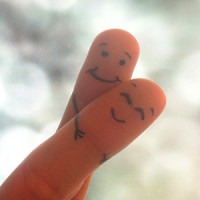Who’s Up for a Healthy Relationship?
The strains of the wedding march had died down and they were toward the end of the ceremony. The handsome groom was asked to take her hand and as he declared his vows he promised his undying love and devotion to his beautiful blushing bride. When it was her turn she looked deep into his eyes and breathlessly spoke her vows. Both of them had finished with the common and oft quoted declaration, “Till death do us part”. Everybody sighed and thought, “What a beautiful ceremony,” and they lived happily ever after, right? Well, only if you were watching a romantic movie or reading a fairy tale. Do you ever notice how in the movies or books the story always seems to end there? We just assume that they lived happily ever after because we want to believe that.
“Till death do us part,” There is no way of knowing how many times this pledge has been declared throughout the years but I would hazard a guess to say that it is too numerous to count. I remember saying it at my own wedding. I’ll go a step farther and say that when most couples make that vow to one another they are more than likely thinking they are so in love that it would HAVE to be death that would make them part ways.
However, I think it is pretty safe to say that it doesn’t take too long after the last piece of rice is thrown that as the couple begins to experience life together they will find there are many opportunities to “part ways” in various shapes and forms. And not too far down the road one or the other will be thinking that if one or the other does not get his or her act together it just might be “death” that WILL be separating them if you know what I mean!
I don’t know if it is the books we read growing up or the fairy tale romantic love we see in the movies (Thanks Disney!), but somehow we grow up thinking that if two people are in love everything will just fall into place naturally but that is not the case. Relationships are unique and they can be quite complex and complicated. It is said that the relationships that work are the ones that have been worked on. That is so true!
The makings of a healthy relationship takes the care and nurturing of two committed adults giving to each other in a way that creates a mutually beneficial connection without compromising ones values or sacrificing oneself for the relationship. Individuality and being exactly who you are should be considered an asset to the relationship. Thereby creating a sense of safety and contentment because each person is free then to be themselves and can ask for what they want and need.
It is acknowledging that the other person is not and cannot be perfect. They are going to make mistakes just as YOU are going to make mistakes. We are but human after all. And when a boundary is crossed, the individual should be able to say so and the other respond respectfully.
Even though we are free to be who we are, we still need to grow as individuals. We need to be responsible and do the work that is necessary for our own growth just as our partner is responsible for theirs. Being emotionally responsible for your own feelings is so important in a healthy relationship. When individuals do not take responsibility for their own feelings, they tend to put the onus on their partner for their own happiness and self-worth. As adults, happiness, emotional safety and self-worth come from how WE treat ourselves and others, rather than from how they treat us. Identifying one’s own needs and wants within the relational context is a crucial piece of being interdependent as opposed to being dependent or codependent.
DEFINING INTERDEPENDENT VS. CO-DEPENDENT
Interdependent – Where each party is able to comfortably rely on the other for help, understanding, and support. The relationship contributes to both individuals resilience, resourcefulness, and inner strength. Meanwhile, each party remains self-sufficient and self-determining. They maintain a clear identity apart from the relationship and are quite able to stand on their own two feet.
Co-dependent – A dysfunctional relationship where both parties are over-dependent on each other. The individuals lean so heavily on one another that both of them are off balance. Much of the love and intimacy is experienced in the context of one person’s distress and the other’s rescuing or enabling. The “helper” shows love primarily through providing assistance even to the point of sacrificing their own needs and the other feels loved primarily when they receive assistance.
A strong and healthy relationship can be one of the best supports in our life. Good relationships can improve all aspects of our lives, strengthening our health, mind, and connections with others. However, if we are in a relationship that is not working, it can be a tremendous drain.
Relationships are an investment. The more you put in, the more you can get back. Giving your relationship what it needs to thrive is a truly loving gesture. The reward will be well worth the effort you put in.
Over the course of my next several blogs I will be sharing some advice for ways of building
relationships that are healthy, happy and satisfying so make sure you check back in the days ahead. However, if you know that you are in an unhealthy relationship and would like to talk to someone right now for help, please call me at (616) 516-1570 or click on the blue contact tab to schedule an appointment. I look forward to your call.

